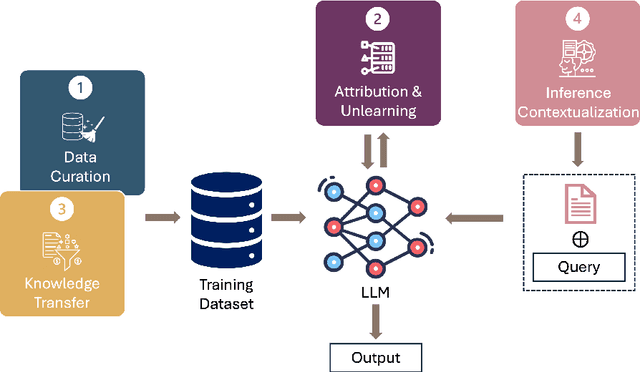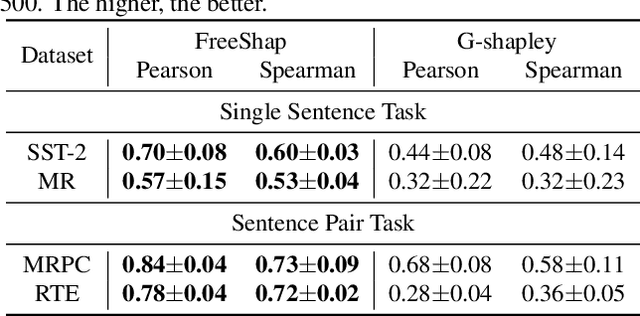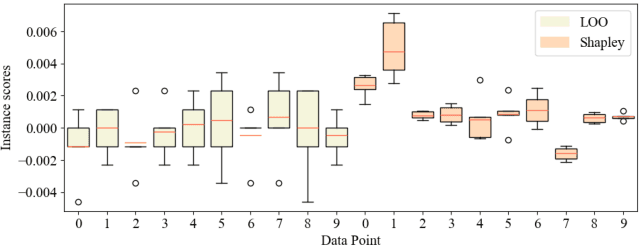Jingtan Wang
Uncovering Scaling Laws for Large Language Models via Inverse Problems
Sep 09, 2025Abstract:Large Language Models (LLMs) are large-scale pretrained models that have achieved remarkable success across diverse domains. These successes have been driven by unprecedented complexity and scale in both data and computations. However, due to the high costs of training such models, brute-force trial-and-error approaches to improve LLMs are not feasible. Inspired by the success of inverse problems in uncovering fundamental scientific laws, this position paper advocates that inverse problems can also efficiently uncover scaling laws that guide the building of LLMs to achieve the desirable performance with significantly better cost-effectiveness.
Group-robust Sample Reweighting for Subpopulation Shifts via Influence Functions
Mar 10, 2025



Abstract:Machine learning models often have uneven performance among subpopulations (a.k.a., groups) in the data distributions. This poses a significant challenge for the models to generalize when the proportions of the groups shift during deployment. To improve robustness to such shifts, existing approaches have developed strategies that train models or perform hyperparameter tuning using the group-labeled data to minimize the worst-case loss over groups. However, a non-trivial amount of high-quality labels is often required to obtain noticeable improvements. Given the costliness of the labels, we propose to adopt a different paradigm to enhance group label efficiency: utilizing the group-labeled data as a target set to optimize the weights of other group-unlabeled data. We introduce Group-robust Sample Reweighting (GSR), a two-stage approach that first learns the representations from group-unlabeled data, and then tinkers the model by iteratively retraining its last layer on the reweighted data using influence functions. Our GSR is theoretically sound, practically lightweight, and effective in improving the robustness to subpopulation shifts. In particular, GSR outperforms the previous state-of-the-art approaches that require the same amount or even more group labels.
Data-Centric AI in the Age of Large Language Models
Jun 20, 2024
Abstract:This position paper proposes a data-centric viewpoint of AI research, focusing on large language models (LLMs). We start by making the key observation that data is instrumental in the developmental (e.g., pretraining and fine-tuning) and inferential stages (e.g., in-context learning) of LLMs, and yet it receives disproportionally low attention from the research community. We identify four specific scenarios centered around data, covering data-centric benchmarks and data curation, data attribution, knowledge transfer, and inference contextualization. In each scenario, we underscore the importance of data, highlight promising research directions, and articulate the potential impacts on the research community and, where applicable, the society as a whole. For instance, we advocate for a suite of data-centric benchmarks tailored to the scale and complexity of data for LLMs. These benchmarks can be used to develop new data curation methods and document research efforts and results, which can help promote openness and transparency in AI and LLM research.
Helpful or Harmful Data? Fine-tuning-free Shapley Attribution for Explaining Language Model Predictions
Jun 07, 2024



Abstract:The increasing complexity of foundational models underscores the necessity for explainability, particularly for fine-tuning, the most widely used training method for adapting models to downstream tasks. Instance attribution, one type of explanation, attributes the model prediction to each training example by an instance score. However, the robustness of instance scores, specifically towards dataset resampling, has been overlooked. To bridge this gap, we propose a notion of robustness on the sign of the instance score. We theoretically and empirically demonstrate that the popular leave-one-out-based methods lack robustness, while the Shapley value behaves significantly better, but at a higher computational cost. Accordingly, we introduce an efficient fine-tuning-free approximation of the Shapley value (FreeShap) for instance attribution based on the neural tangent kernel. We empirically demonstrate that FreeShap outperforms other methods for instance attribution and other data-centric applications such as data removal, data selection, and wrong label detection, and further generalize our scale to large language models (LLMs). Our code is available at https://github.com/JTWang2000/FreeShap.
WASA: WAtermark-based Source Attribution for Large Language Model-Generated Data
Oct 01, 2023



Abstract:The impressive performances of large language models (LLMs) and their immense potential for commercialization have given rise to serious concerns over the intellectual property (IP) of their training data. In particular, the synthetic texts generated by LLMs may infringe the IP of the data being used to train the LLMs. To this end, it is imperative to be able to (a) identify the data provider who contributed to the generation of a synthetic text by an LLM (source attribution) and (b) verify whether the text data from a data provider has been used to train an LLM (data provenance). In this paper, we show that both problems can be solved by watermarking, i.e., by enabling an LLM to generate synthetic texts with embedded watermarks that contain information about their source(s). We identify the key properties of such watermarking frameworks (e.g., source attribution accuracy, robustness against adversaries), and propose a WAtermarking for Source Attribution (WASA) framework that satisfies these key properties due to our algorithmic designs. Our WASA framework enables an LLM to learn an accurate mapping from the texts of different data providers to their corresponding unique watermarks, which sets the foundation for effective source attribution (and hence data provenance). Extensive empirical evaluations show that our WASA framework achieves effective source attribution and data provenance.
 Add to Chrome
Add to Chrome Add to Firefox
Add to Firefox Add to Edge
Add to Edge